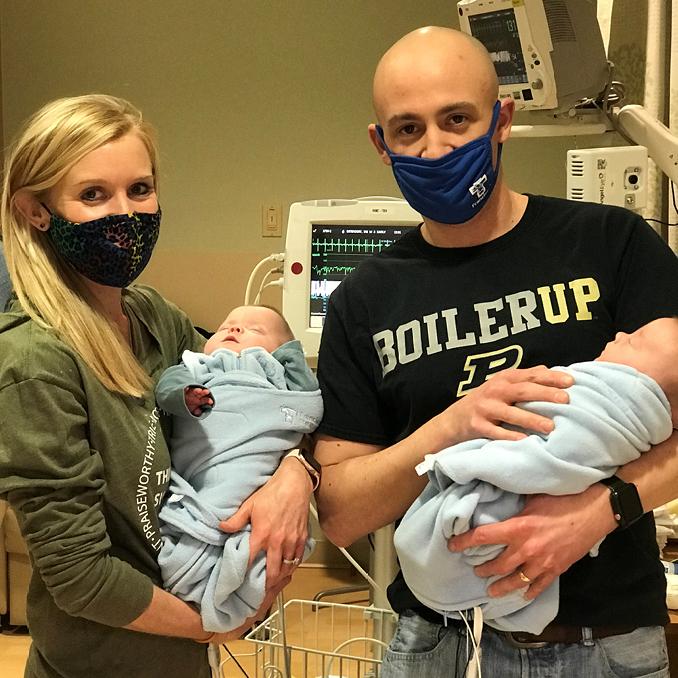Cameras let parents connect with their babies 24/7
For parents of a baby who needs special care in a neonatal intensive care unit (NICU), the excitement of welcoming a new member to the family is tempered with worry. Wanting to be at the hospital with the baby but needing to be at work or home caring for other children is a stressful tug on their hearts.
Katey and Mike Ostendorf knew that tug well. Their twin boys, Will and Drew, were born at 25 weeks at Franciscan Health Lafayette East on September 10, 2020. Instead of going to a scheduled obstetrician appointment that day, "we found ourselves meeting with a NICU doctor," Katey says. "We had a long road ahead."
Three weeks into the babies' stay, a new camera system installed in the NICU helped ease some of their worries. The AngelEye Health Live-Streaming Camera allows parents and family members to check in on their little one from any device 24/7. The live video stream uses unique infrared technology to make it possible to see the baby even in the darkest environments.
"We wanted to find a way to give parents visual contact with their baby," said Marcia Cherry, RN, director of the Women's Center, NICU and Pediatrics at Franciscan Health Lafayette East. "AngelEye removes barriers for families, especially now during visitation restrictions due to COVID-19. Siblings, grandparents or anyone parents give access to can see the baby anytime, from anywhere."
Made possible through the support of the Franciscan Health Foundation and its donors, each of the NICU's 14 private rooms has a camera. Two additional mobile cameras are also available. Parents are enrolled in the system when the baby is admitted to the NICU. "It was super easy," Katey recalls. "We gave them our email address and set up our account. We could share the link with whomever we wanted."
Parents can give access to an unlimited number of people and control who has access. The only time the camera is off is when nurses are caring for the baby or during procedures.
Thanks to AngelEye, Mike could check in on the boys throughout the day from work. Katey checked in before making the daily commute to the hospital from their home in DeMotte, and when she got home at night. "I could watch the boys when I was up in the middle of the night pumping," Katey says. "Knowing I could look at them in real-time whenever I wanted made it easier when I had to leave the hospital. It made my heart feel better."
Katey wasn't the only one checking on the boys in the pre-dawn hours. "My dad was on at 4 a.m. and saw that Will was restless and crying a little. One of the nurses went to comfort Will, and Dad said it made his heart smile so big,” Katey says.
The system also offers text messaging. "If I had a question for the nurses or they had information for me, we could message back and forth," Katey says. "Sometimes, the nurse would write a note about something cute the boys did and put it in their bed, and we could read it when we were on."
In addition to easing parents' stress about being away from the baby, the technology also promotes family bonding, making for a smoother transition when the baby goes home.
On January 12, after 124 days in the NICU, Will and Drew were healthy and strong enough to go home, just in time for Katey's birthday the next day. "It was the best gift ever."
Want to Make an Impact?
GIVE NOW

